Plunging Stocks, Gold Miners, and Lucrative Implications
2024.08.08 05:41
The stock markets around the world are sliding, and so does – just as I warned.
Miners invalidated their tiny breakout, closed below the July low on Friday, and they are poised to slide even more. That’s just the beginning!
Let’s start with a quote from my Friday’s Gold Trading Alert:
Stocks might have had their “oops” moment this week.
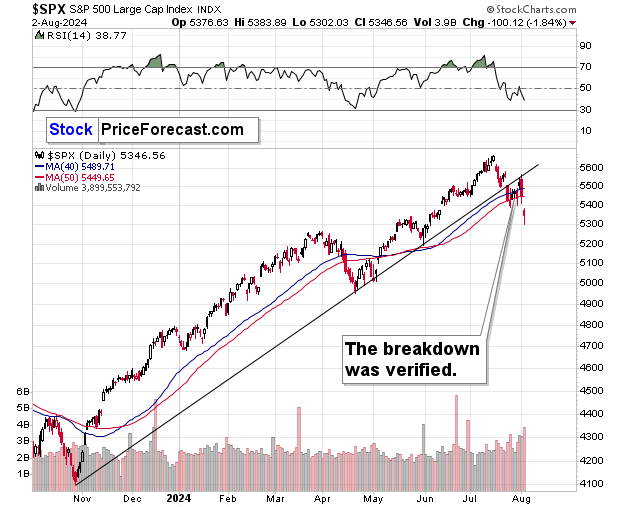
The declined in the second half of July, and it rallied back up on Powell’s dovish remarks. However, it seems that at this point everyone who could be in, is already in (and leveraged), because the price fell right after it had rallied.
If the stock market really wanted to rally here, it could have used the “rates are going lower” narrative to keep climbing. But the opposite happened. Where were the buyers yesterday?
Technically, stocks broke below their rising support line and then they verified this breakdown by moving back to the broken line and then declining from it. The declines can now continue.
And what happened next?
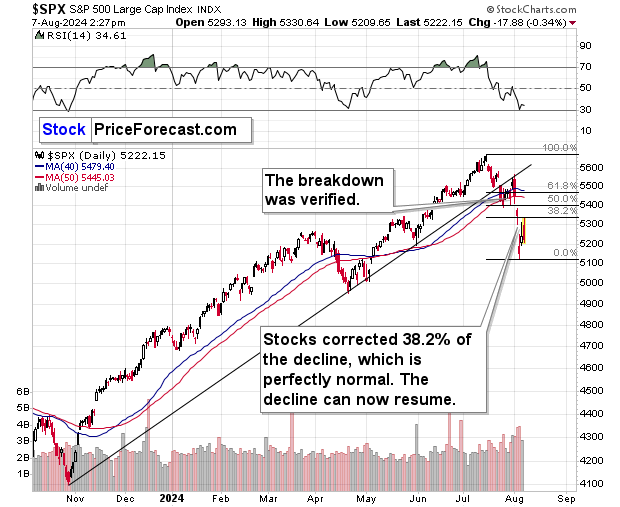
Stocks plunged, then they corrected 38.2% of the decline (which is perfectly normal and NOT bullish), and now they appear to be declining once again.
The S&P 500 has little support before reaching the 5,000 level, where we have the previous 2024 low and the rising long-term support line (not visible one the above chart). That’s likely to generate a rebound, which people will most likely – mistakenly – take for a major bottom.
Fundamental Indications Point to More Declines
This is not just a small technical correction, and we have fundamental indications all over the place – the most important likely being the unwinding of the carry trade.
With higher interest rates in Japan, those who were borrowing and using yens to purchase all sorts of assets (stocks, gold, commodities etc.), are now reversing those transactions, and the impact is huge.
The 2008 was a liquidity crisis that started with the housing market. This time, we have the yen carry trade reversal. The direct reason is not as important as the fact that the implications are similar.
Traders will have to raise the money to pay back the yen or face dire consequences. How would they raise it? Selling the assets they bought in the first place.
Back in 2008 investors were perplexed by multiple assets declining at the same time – even gold, which was “supposed to” provide protection and hedge in those times.
But if was one of the assets that was actually sold in order to raise what was borrowed/needed (fiat money), then its price fell.
If you have any doubts if this is something really important, please look at the carnage that is happening on the Japanese stock market.
In the July 31 Gold Trading Alert, I wrote the following:
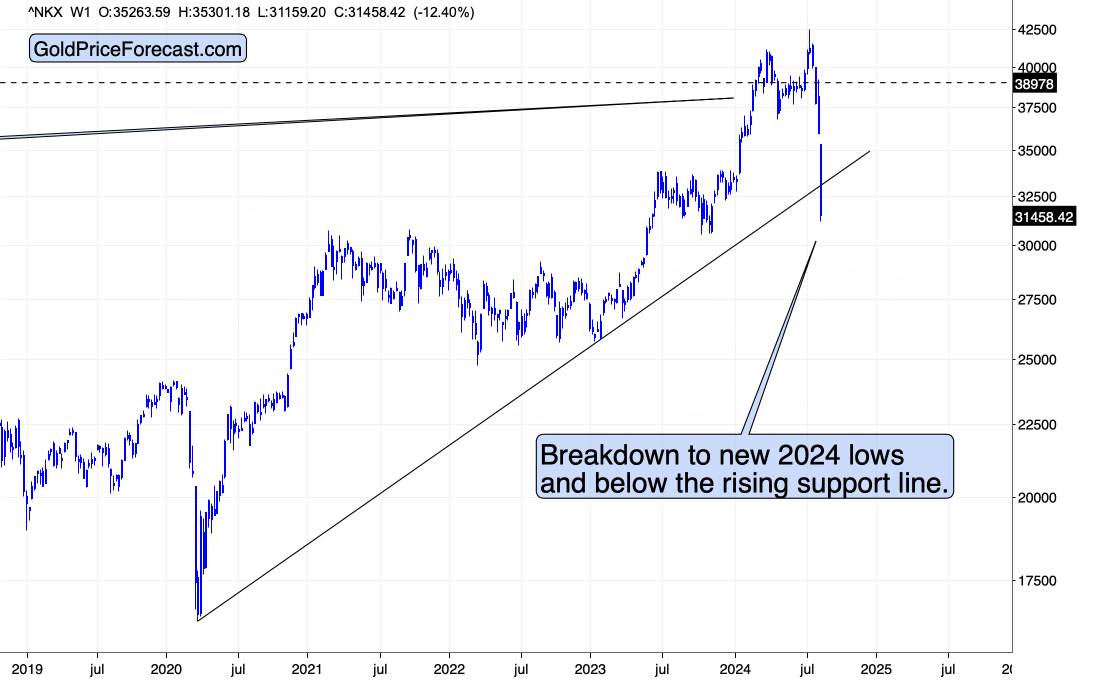
Theoretically, higher rates on the yen should be bullish for the yen and bearish for the USD/YEN pair, however, after the first rate hike, the pair rallied, so it’s not clear if it will really work in this way going forward.
Perhaps the Japanese investors will want to buy dollars to buy the U.S. stocks, as higher rates on the domestic market can hit the local companies in a major way.
And indeed, something major is happening on the Japanese stock market.
After finally breaking slightly above the previous all-time highs, invalidated this move, flashing an extremely strong sell signal.
Right now, the index is trading slightly above the previous high, but the previous invalidation plus the fact that the rates were just hiked suggests that the rally is most likely over.
On a side note, this chart might be interesting to those, who say that stocks can only move up because they were moving higher in the recent years.
That’s what people thought at the end of the 1980s, too, with regard to the Japanese stocks.
After that top, stocks have been declining for about 18 years, and people waited about 34 years just to get even – and they got even only in nominal terms, which means that they still lost a lot of capital in real terms.
So, can the U.S. stocks slide once the AI bubble bursts?
Of course.
It could be the case that investors fearing this decline will want to get out of the Japanese stock market – and out of yen, which would put a downward pressure on the value of this currency – pushing the USD/YEN and the higher.
At the same time, higher rates in Japan mean that the yen carry trade is much less favorable, which puts a strain on multiple leveraged markets at the same time. And by all leveraged markets, I mean pretty much all the markets, including commodities and gold.
My point here is: viewing the rate hike in Japan as something bullish for gold is incorrect. In one way it could lower the value of the USD Index, but it doesn’t have to, and through unwinding the yen carry trade mechanism, the impact on the precious metals market is likely to be negative.
This might not play out immediately, as markets will still be taking their time to act on this information, but this should NOT be ignored.
Also, falling stocks in Japan could easily trigger falling stocks in the rest of the world.”
The situation on the forex market is still chaotic, but the rest is already playing out as I had described above.
Japanese Stocks Plunge Below 2024 Lows
After trying to move above their 1990 nominal high, the Japanese stocks plunged below their 2024 lows! Imagine the disappointment – waiting so long to see stocks at new highs, for all this to be invalidated and then the entire year of gains was erased very quickly.
Remember this analogy because we’re most likely going to see the same thing in mining stocks.
Oh, one more thing. Remember about the new gold? Bitcoin? I wrote that it was likely to fall after it failed to move above its previous high.
For a few days, it seemed that Bitcoin got a boost thanks to Trump’s favorable take on it, but This wasn’t enough to overcome the selling pressure from all those, who have already bought and were disillusioned with crypto’s potential.
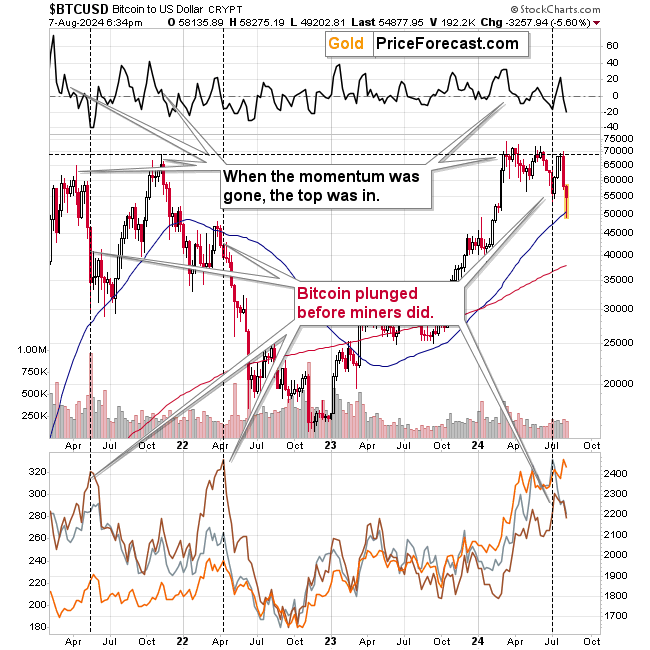
Bitcoin plunged below $50k. It moved back up, but given what’s happening in other markets and given its triple failure to move above the 2021 highs, the odds are that the slide will continue.
Remember how bitcoin’s slide preceded the one in the precious metals (in particular in mining stocks) in 2022? That’s most likely about to be repeated.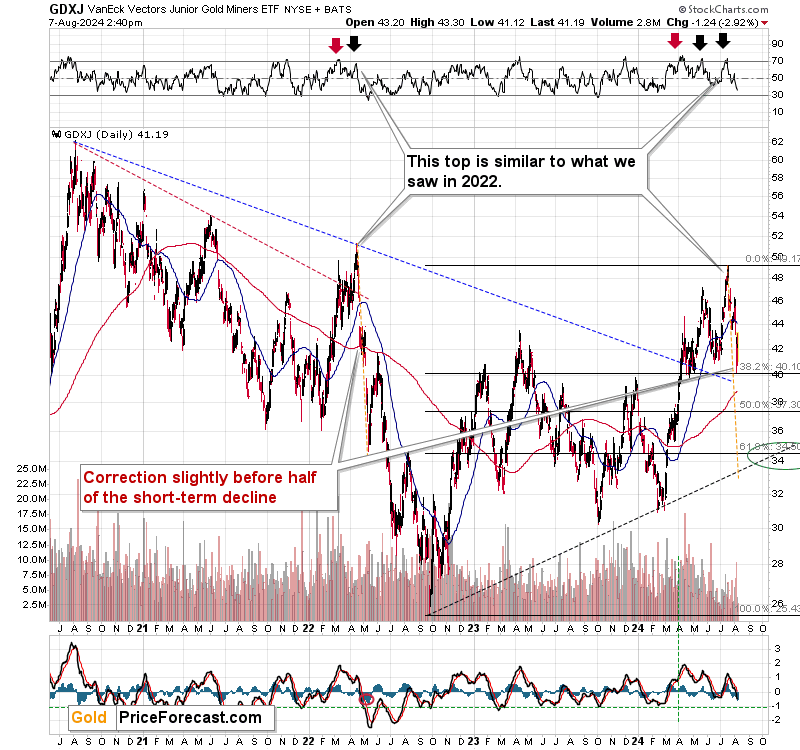
The decline is already quite sizable but compared to what’s likely to come (the USD Index hasn’t even started to rally profoundly yet), it seems to be just a blip on the radar screen.
We have strong support at about $34, which is where we might see a tradable rebound, but for now, the biggest opportunity is – in my opinion – on benefitting from declining junior mining stock values.
Shorting is an option that some will choose, but in my Gold Trading Alerts, I’m writing about a modified approach that used to provide even better results (and it’s providing better results in the current decline as well).







